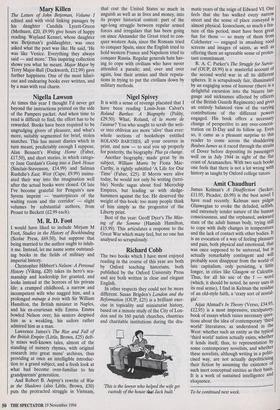Richard Cobb
The two books which I have most enjoyed reading in the course of this year are both by Oxford teaching historians, both published by the Oxford University Press and are both written in clear and elegant English.
In other respects they could not be more different. Susan Brigden's London and the Reformation (OUP, £25) is a brilliant exer- cise in topicality and miniaturist history, based on a minute study of the City of Lon- don and its 160 parish churches, chantries and charitable institutions during the dra- 'This is the lawyer who helped the wife get custody of the house tket Jack built.' matic years of the reign of Edward VI. One feels that she has walked every narrow street and the sense of place conveyed is almost physical. Iconoclasm, so much a fea- ture of this period, must have been great fun for those — so many of them from Colchester — engaged in smashing rood screens and images of saints, as well as offering them an agreeable sense of protes- tant commitment.
R. A. C. Parker's The Struggle for Surviv- val (OUP, £8.99) is a masterful account of the second world war in all its different spheres. It is scrupulously fair, illuminated by an engaging sense of humour (there is a delightful excursion into the bizarre lan- guage and nicknames affected by officers of the British Guards Regiments) and gives an entirely balanced view of the varying contributions of the different powers engaged. His book offers a necessary change of perspective to any over-concen- tration on D-Day and its follow up. Even so, it came as a pleasant surprise to this reader to come across the shuddering Reuben James as it raced through the straits of Dover before depositing its passengers well on in July 1944 in sight of the flat coast of Aramanches. With two such books one feels that there is not a lot wrong with history as taught by Oxford college tutors.


















































































 Previous page
Previous page